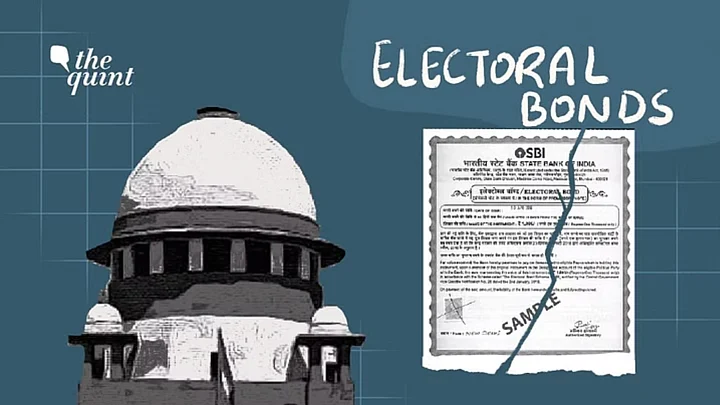In a major blow to the Centre, the Supreme Court on Thursday, 15 February, struck down the electoral bonds scheme, stating that it was in violation of Article 19(1)(a) of the Indian Constitution.
Chief Justice of India DY Chandrachud said that electoral bonds were "unconstitutional" and "arbitrary" and would give rise to quid pro quo arrangements between political parties and financial contributors.
Additionally, the top court directed banks to stop issuing electoral bonds and asked the State Bank of India (SBI) to submit the details of all electoral bonds that have been purchased since 12 April 2019 till date to the Election Commission of India.
"SBI shall furnish the details of electoral bonds encashed by the political parties. SBI shall submit the details to the ECI in three weeks and ECI shall publish these details on the website," the Supreme Court said.
The landmark verdict was pronounced by a five judge-bench led by CJI Chandrachud after reserving its verdict in the matter in November 2023.
What Else Did the Supreme Court Say?
The court also said that the provision amended by the 2017 Finance Act does not recognise that the harm of contributions made by loss-making companies in the form of quid pro quo is much higher.
"Thus the amendment is manifestly arbitrary for not making a distinction between profit-making and loss-making companies for the purposes of political contribution," the apex court's judgment read.
The court also said that the stated objective of electoral bonds to fight black money and maintain the confidentiality of donors cannot be used to defend the scheme.
The Supreme Court further observed that the scheme infringes upon the right to information of the voter.
"We are of the opinion that the information about funding to a political party is essential for a voter to exercise their freedom to vote in an effective manner. The Electoral Bond Scheme and the impugned provisions to the extent that they infringe upon the right to information of the voter by anonymizing contributions through electoral bonds are violative of Article 19(1)(a)," the Supreme Court noted in its order.
"A company has a much graver influence on the political process, both in terms of the quantum of money contributed to political parties and the purpose of making such contributions. Contributions made by individuals have a degree of support or affiliation to a political association. However, contributions made by companies are purely business transactions made with the intent of securing benefits in return. The amendment to Section 182 is manifestly arbitrary for treating political contributions by companies and individuals alike."Supreme Court in its electoral bonds verdict
What are electoral bonds?
Electoral bonds are a financial instrument whereby individuals and business entities can donate money to political parties without having their identities revealed. As per the rules of the scheme, anybody who is a citizen of India and any business which has been established in the country can buy electoral bonds. These bonds are available in denominations ranging from Rs 1,000 to Rs 1 crore.
The Centre had introduced the electoral bonds scheme in January 2018 as a mechanism to replace cash donations, claiming that it would make political funding more transparent.
What Were the Arguments Made During the Hearing?
During the course of the hearing, the petitioners had argued that the scheme was obtrusive of a citizens' right to know where political parties get their funding, which constitutes a fundamental right as per Article 19(1)(a) of the Constitution. The petitioners include the Communist Party of India (Marxist), the Congress' Jaya Thakur and Association for Democratic Reforms (ADR).
Appearing on behalf of the Centre, Attorney General R Venkataramani had said that Article 19(1)(a) does not guarantee an absolute right to information regarding political parties' sources of funding.
He had stated that there are "limitations" to the fundamental right to information, and that people cannot have the right to have knowledge of "anything and everything."
"The scheme in question extends the benefit of confidentiality to the contributor. It ensures and promotes clean money being contributed. It ensures abiding by tax obligations. Thus, it does not fall foul of any existing right," Venkataramani had said.
In April 2019, the Supreme Court had refused to stay the electoral bonds scheme, arguing that there was a need for a "weighty hearing" on the issue.
